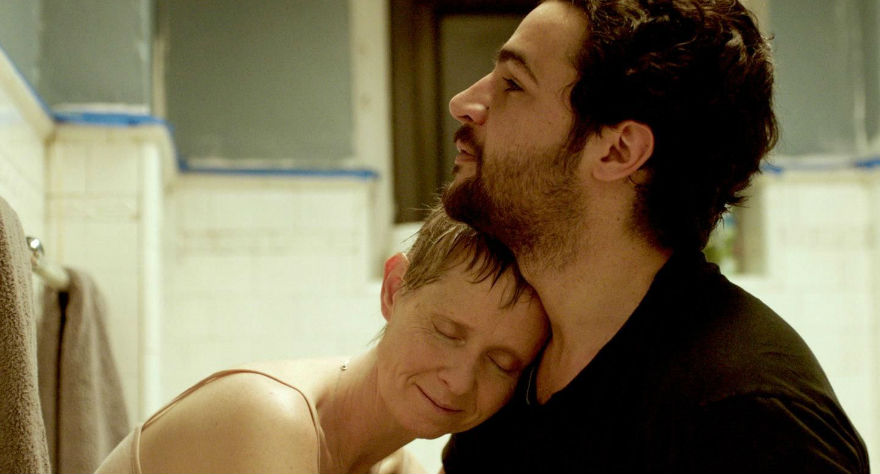
Soulful storytelling and two breakthrough performances make this one an emotional powerhouse.


Soulful storytelling and two breakthrough performances make this one an emotional powerhouse.

In one of the most riveting lead performances of 2015, Christopher Abbott plays the emotionally adrift James White. He’s a twentysomething in the midst of a terrible family double-tragedy: his father’s just passed and his mother, Gail (Cynthia Nixon), has terminal cancer. It’s a chilly November morning in New York City and there’s a memorial for his father being held at his mom’s apartment where friends and family have gathered to mourn, but that’s not where James is. James is slumping through a raging club, drunk and delirious, pushing his way past sweaty young bodies in his stinky gray hoodie (which he seldom changes). He emerges from the den of excess, steps into sunlight and hops into a cab. When he finally arrives at the gathering, he meets the grieving guests with dark circles under his eyes, smelling of gym socks and booze. All he wants is for everyone to leave so that he can continue to bum on his mom’s couch and party every night. He’s an easy read: Scumbag. Slacker. Fuck-up. Freeloader.
James White, the moving directorial debut of Brooklyn filmmaker Josh Mond, doesn’t let you write James off so easily. In addition to being a total slob and a bully who’s more than happy to lay hands on any stranger who rubs him the wrong way, he’s an attentive caregiver, a loving son and a good friend. He’s only got one friend, Nick (Scott “Kid Cudi” Mescudi), but they’re tight; they back each other up in bar fights, and Nick’s happy to help take care of Gail at the drop of a hat. James can be a dick, but slowly we begin to understand his mental oddities and hangups. He unleashes his anger on people outside of his tiny inner circle because he’d never intentionally hurt the ones he loves. Does that make him a good guy? An asshole? He’s neither, existing in that complicated, dark, mysterious space in between. He’s a ticking time bomb, and as his story unfolds, we learn what makes him tick.
Sympathy for James blossoms as we get to know him, but melodrama and sentimentality are virtual non-factors in Mond’s storytelling. James White is a chillingly up-close-and-personal observation of a young man bubbling with so much emotion that he exists perpetually at the precipice of physical and psychological implosion. Dire, stressful situations like James’ are ugly and messy and horrible, so Mond doesn’t attempt to paint a pretty picture.
Still, glimmers of sweetness arise as we unpack James’ mental baggage. He’s got some serious (scary) anger issues, but being around his mother brings out his softer, compassionate side: When Gail’s admitted to the hospital following a frightful mental lapse, James gets frustrated that he can’t find her a bed amid the chaotic hospital traffic of busy doctors and nurses. In the name of her well being, he tries exercising patience. “All I’m trying to do is get her a bed,” he pleads with the bed manager. “She’s down there sitting in her own shit. I’m just trying to do anything I can do to help her.” The most powerful scene involves son helping mother from bedroom to bathroom, carrying her weight as she’s too sick to stand. Gail’s too exhausted to make it back to her bed and asks James to sit for a minute, burying her head in his chest. “Where do you want to be?” he asks her gently. “Paris,” she whispers.
Such subtle, penetrating character work is a hallmark of the film collective to which Mond belongs, Brooklyn’s Borderline Films. Mond and fellow filmmakers/best friends Sean Durkin and Antonio Campos were the guys behind Martha Marcy May Marlene and Simon Killer, and James White fits comfortably into the group’s catalogue of low-and-slow psychological dramas.
The Borderline fellows have also exhibited a keen eye for visual poetry and meaning, and Mond’s film may just be their crowning achievement in that regard. Cinematographer Mátyás Erdély employs the same clingy, close-proximity technique that made his work on Son of Saul so widely discussed and dissected in cinephile circles, almost never straying more than a foot from James side even as he rushes through swinging doors to escape uncomfortable interactions. Staying so tight on James never gives us an inch of breathing room should we feel the urge to shy away from his pain or the tension of the disaster he’s dealing with.
Given this perma-close-up technique pretty much defines the film visually, the pressure was on Abbott to turn in a breakthrough performance, and he obliged to astounding effect. The former Girls actor powers through the movie with the force and velocity of a cannonball, bringing a different color and energy to each scene. Without a doubt, Abbott proves he’s a world-class talent, and Nixon’s equally stunning performance takes James White to another level.